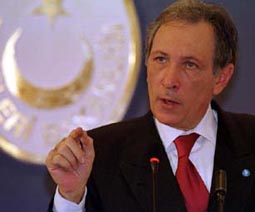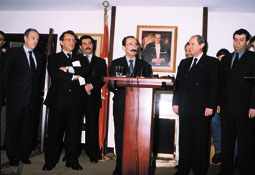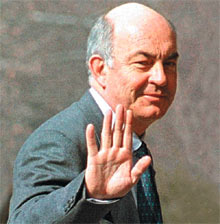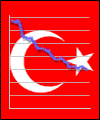11
July 2002
![]()
2. "Turkish foreign minister resigns", Turkish Foreign Minister Ismail Cem announced his resignation on Thursday, dealing a major blow to the embattled government of Prime Minister Bulent Ecevit.
3. "Dream Team" emerges from Turkey's political chaos", an alliance of political heavyweights, dubbed the "Dream Team", is emerging from Turkey's crisis of government and is already being touted as the best hope of averting collapse.
4. "ANALYSIS - EU frets over Turkey crisis, ties under threat", the European Commission, the executive body overseeing the enlargement of the Union to the east and south, is worried about the government crisis in Ankara but has no wish to be seen to be meddling in Turkey's internal affairs.
5. "Top court rejects HADEP's objections in closure case", the Constitutional Court on Wednesday rejected the objections made by the pro-Kurdish People's Democracy Party (HADEP) in the legal case that could shut down Turkey's only legal Kurdish grouping.
6. "Rights of Kurds should be granted", at the sessions of Organization of Security and Cooperation in Europe (OSCE) Annual Parliamentary Assembly, the report "Confronting terrorism: a global challenge for the 21st century" was adopted after much debates and the rights of the Kurdish people were asked to be recognized.
7. "Rebel Kurds at heart of plan to split country into two regions", a significant attempt is being made by Iraq's notoriously fractious opposition groups to agree on a model for a post-Saddam state that would guarantee the Kurds their own federal region and the rights of the country's ethnic and religious groups.
8. "U.S. Capable of Quick Iraq Strike", the United States is capable of launching a rapid attack on Iraq by marshaling 50,000 troops at the Kuwaiti border in roughly a week, airlifting them in and bringing their tanks and heavy equipment on ships through the Strait of Hormuz.
1. - AFP - "Council of Europe urges Turkey to speed up judicial reform":
STRASBOURG / 10 July 2002
The Council of Europe urged Turkey on Wednesday to accelerate without
delay reform of its judicial system and police training following new
complaints of torture and ill treatment by Turkish prisoners. The pan-European
human rights body's committee of ministers issued a progress report
Wednesday on Turkey's moves to comply with judgements handed down by
the European Court of Human Rights.
The committee said it was "concerned at the continuing existence of new complaints of alleged torture and ill-treatment as evidenced notably through the new applications lodged with the European Court." It said 42 judgements and decisions found that Turkey was responsible for numerous breaches of the Convention for the Protection of Human Rights including homicides, torture and destruction of property all inflicted by its security forces.
Turkey's human rights record has been under intense scrutiny in recent years as it strives to implement reforms that will pave its way to future European Union membership. While noting most of the violations took place in the first half of the
1990s against a background of extremist violence and that Turkey had made "some progress" since, the ministers called on Turkey to expedite the reform process.
The report said while there had been a general improvement in the treatment of people detained in Istanbul, there were a "considerable number of allegations of serious forms of ill-treatment reported in the south-eastern regions." There was also "continuing existence at certain police stations in these regions of interrogation facilities of a highly-intimidating character."
The committee said Turkey needed to rapidly reorganise education and training of security force members to ensure respect for human rights in the performance of their duties. It called on the Turkish government to modify the system of criminal prosecution of security force members to ensure prosecutors were able to properly identify and punish those responsible for abuse. Turkey also needed to ensure an effective compensation system for victims.
The committee also called on Turkey to offer training
for prosecutors and judges "in human rights so that they can ensure
effective respect of the Convention by security forces". ![]()
2. - AFP - "Turkish foreign minister resigns":
ANKARA / July 11 
Turkish Foreign Minister Ismail Cem announced his resignation on Thursday,
dealing a major blow to the embattled government of Prime Minister Bulent
Ecevit.
In a written statement to the semi-official Anatolia news agency, Cem, the last remaining heavyweight in Ecevit's tattered Democratic Left Party (DSP), said he was qutting both his government post and the party.
"I will reveal my motives and my thoughts about
the future to the public at
a press conference tomorrow (Friday)," Cem said.
The highly popular Cem, 62, became the seventh minister to abandon Ecevit's government since Monday when the ailing prime minister's right-hand man and deputy, Husamettin Ozkan, spearheaded mass defections amid a rift over the future of the government.
Cem's resignation was expected to spark a new wave of resignations from the DSP, which had already lost 36 members, and which has pushed the government to the brink of collapse.
Turkish government headed for collapse
Turkey's embattled coalition appeared Thursday to be headed
towards collapse with the expected resignation of Foreign Minister Ismail
Cem, the last remaining heavyweight backer of ailing Prime Minister
Bulent Ecevit.
The 62-year-old Cem, who has held the foreign affairs portfolio since 1997, has made up his mind to quit the government and Ecevit's Democratic Left Party (DSP) in a move widely tipped to trigger more top-level resignations from the already weakened party. Ecevit, whose ill health has kept him away from office for the past two months, has seen his party and government erode in the past three days as more than 30 deputies, including six ministers, have quit over his refusal to step down.
A departure of Cem, which is expected on Friday, is largely seen as the death blow to the shaky three-party coalition, wrecked by deep divisions with Ecevit's partners backing widespread calls for snap polls. "The continuation of the government depends only on the coalition partners' willingness to carry on their shoulders or even drag the political corpse of Bulent Ecevit," columnist Enis Berberoglu said in the liberal Radikal daily.
"But as the prime minister has said, there is no place for emotions in politics. Elections are inevitable," he added. Leading Turkish newspapers heaped the blame for the fallout on the 77-year-old Ecevit, who has run the DSP with an iron grip along with his wife Rahsan but has made no preparations for an heir. The veteran leader has so far kept silent on the defections, which began on Monday when Deputy Prime Minister Husamettin Ozkan -- Ecevit's former right-hand man once dubbed his "adopted son" -- quit after the two fell out.
"Ecevit has commited a grave mistake by pushing Ozkan and his friends to resignation and failing to stop Cem from following suit. He is putting a dramatic end to his own career," columnist Guneri Civaoglu said in the mass-circulation Milliyet daily. In a bid to prove that the government was still up and running, the prime minister has named replacements for government posts left vacant by the defectors and chaired a coalition meeting on Wednesday, the first he attended since he fell ill in early May.
But the Ecevit has left seems to depend on if and when Ozkan and Cem ally themselves with independent Economy Minister Kemal Dervis -- the architect of a crucial economic recovery programme -- to set up a new political party. Such a formation is widely expected by Turkey's financial markets -- battered by political uncertainty despite recent improvements in macro-economic indicators -- and would be welcomed by the public as fresh blood to a political landscape dominated by old-timers. The only concession Ecevit has so far made has been to acknowledge for the first time that he might be forced to reluctantly bring elections forward from the scheduled date in 2004.
"I believe early elections would be wrong, but if
they become compulsory under these circumstances, we will have to comply,"
Ecevit told the mass-circulation Milliyet newspaper on Wednesday. Conditions
may soon compel Ecevit to call early elections, especially after the
coalition's far-right wing, the Nationalist Action Party (MHP) submitted
to the parliament Wednesday a proposal to summon lawmakers for an extraordinary
session in September to vote for snap polls in November. But Ecevit
stil insisted that there was no need for him to resign. "(MHP leader
Devlet) Bahceli said that I should continue as prime minister regardless
of the number of seats the DSP has in parliament," he said. ![]()
3. - AFP - "Dream Team" emerges from Turkey's political chaos":
ANKARA / 11 July 2002 / by Sibel Utku
An alliance of political heavyweights, dubbed the "Dream Team",
is emerging from Turkey's crisis of government and is already being
touted as the best hope of averting collapse. The three-party ruling
coalition is teetering on the brink of collapse, paralyzed since early
May when Prime Minister Bulent Ecevit, 77, fell ill and a deadlock over
urgently-needed democracy reforms to boost Turkey's struggling bid to
join the European Union. The new political movement, engineered by Ecevit's
former right-hand man and deputy, Husamettin Ozkan, is unlikely to resolve
the crisis quickly but it is has raised hope that the end may be within
sight. 
Ozkan, the coalition's former trouble-shooter, led a mass defection
from Ecevit's government and party on Monday, leaving the ailing veteran
isolated. Linking up with Ozkan are two key players: the much-trusted
Economy Minister Kemal Dervis, the driving force of an IMF-backed economic
recovery program and the highly popular Foreign Minister Ismail Cem.
One commentator described the two ministers as the "dream team"
of Turkey's pro-EU urban elite. The three men held a meeting Wednesday
evening, unleashing speculation that Cem had decided to resign and join
the mutineers against Ecevit, who now total about 35 since Monday.
"We are hopeful again," the mass-circulation daily Sabah trumpeted in a front-page headline on Thursday. "Exasperated by economic crisis and fruitless wrangling for more than a year, Turkey's morale has been lifted with the Ozkan-Cem-Dervis alliance," it added. Turkey's financial markets, which have massively plunged since May, have welcomed the fledgling alliance and the prospect of snap polls, the index of the Istanbul stock exchange rising by almost two percent on Wednesday. Columnist Hasan Cemal wrote in the liberal daily Milliyet that he had asked Ozkan whether the trio was embarking on a new political initiative together. Ozkan's answer was: "Of course."
Cem was expected to formally announce his resignation in a few days and then assume the leadership of a new party to be formed with the support of the defectors from Ecevit's Democratic Left Party (DSP). Dervis, on the other hand, was expected to keep his post as economy minister in the government as long as it survives, press reports said. The media was awash with speculation about the political plans of the trio, whose main objectives are said to keep crucial economic reforms on track and push ahead with democracy reforms to boost Turkey's chance of getting a date for the start of its accession talks with the EU by year-end.
According to the media, the trio will set up a new party
in parliament and seek to unseat Ecevit's government to lead the country
until early elections, which appear imminent. Ecevit, who has steadfastly
declined to step down and call early polls in the past two months of
turmoil, acknowledged in a newspaper interview on Wednesday, that bringing
elections forward from April 2004 was possible, bowing to pressure from
his two coalition partners and the oposition. A spate of meetings that
Dervis and Ozkan have recently held with prominent figures from the
center-right and the center-left and the business community point to
the new movement's bid to win support from a broad centrist base in
the hope of winning the early elections. "This party should be
the party of all of Turkey... Such a party will open broad prospects
for the country," the editor-in-chief of Turkey's biggest daily
Hurriyet, Ertugrul Ozkok, said. ![]()
4. - Reuters - "ANALYSIS - EU frets over Turkey crisis, ties under threat":
The European Commission, the executive body overseeing the enlargement of the Union to the east and south, is worried about the government crisis in Ankara but has no wish to be seen to be meddling in Turkey's internal affairs.
BRUSSELS / 11 July 2002 / by Gareth Jones 
Turkey's political turmoil could put new strains on its sensitive
relationship with the European Union, making a crisis over Cyprus's
bid to join the EU more likely, diplomats and political analysts say.
Bulent Ecevit's three-party government was teetering on the brink of collapse on Wednesday after several ministers resigned and his party mutinied amid growing concern over the premier's health and the fate of desperately needed economic reforms.
Turkey has been a formal candidate for EU membership since December 1999 but has yet to open accession negotiations because of continued concerns in Brussels over human rights abuses.
The European Commission, the executive body overseeing the enlargement of the Union to the east and south, is worried about the government crisis in Ankara but has no wish to be seen to be meddling in Turkey's internal affairs. "We are following the situation very closely. This is obviously a matter for Turkey but we are sure that Turkish institutions will work to ensure political stability and to maintain the momentum of reforms," Commission spokesman Jean-Christophe Filori told Reuters.
Privately, EU diplomats say the crisis, which coincides with the crucial, final stage of enlargement talks with 10 candidates including the divided island of Cyprus, has the potential to damage EU-Turkey relations, possibly quite badly.
Cyprus factor
The EU wants Ankara to pressure the Turkish Cypriot state in northern Cyprus into cutting a deal with the Greek Cypriots who run the internationally recognised government that would let Cyprus enter the EU, probably in 2004, as a reunited island.
An agreement would also facilitate Turkey's own bid to open accession talks, although it is also required to scrap the death penalty, ensure civilian control of the armed forces, guarantee freedom of speech and grant cultural rights to minority Kurds.
Prolonged political turmoil in Ankara would reduce the chances of a Cyprus settlement before a summit in Copenhagen in December when the EU expects to conclude enlargement talks with the Greek Cypriot government, among numerous other candidates.
"It also means Turkey is unlikely to pass the reforms it needs to if it wants the EU in Copenhagen to announce a date for launching its own accession negotiations," said one diplomat.
In the past, Ecevit has suggested Turkey might formally annex northern Cyprus if the EU effectively admitted only the Greek Cypriot part. That would sink Turkey's own EU ambitions.
The EU would prefer a peace settlement but has said it would admit a divided island if there is no deal. Greece has threatened to block the whole historic EU enlargement project into eastern Europe if Cyprus is not included in the first wave.
Scouring the storm clouds for the glint of a silver lining, some diplomats say an early Turkish election -- Ecevit does not in theory have to call a vote until 2004 -- might produce a new political dynamic in Ankara and, hopefully, more clarity.
Ecevit's coalition includes a right-wing nationalist party hostile to the EU and to the reforms needed to join it.
"Polls suggest the Islamists could come to power and they have been making some quite pro-EU noises. After all, the EU means democracy and openness and protects them from the army," said one diplomat. The powerful Turkish military establishment sees itself as the guardian of Turkey's secular constitution and forced out the last Islamist-led government, five years ago. Another diplomat said an early Turkish election might not be good for a Cyprus settlement but neither was today's confusion. Some are hoping pro-Europe Economy Minister Kemal Dervis and Foreign Minister Ismail Cem could gain sway in a new government.
Strategy needed
Political analysts say the EU can do little to shape events in Turkey but urgently needs to develop a more coherent strategy towards its big Muslim neighbour.
"Turkey is the litmus test for whether the EU can build a strong and viable common foreign policy," said Heather Grabbe of the Centre for European Reform, a London-based think-tank.
She said the EU needed to speak to Turkey with a single and consistent voice. It should not bend the rules to let Turkey in but should show it is serious about Ankara's candidacy.
Turkish politicians have often complained that the EU does not really want to admit their large, overwhelmingly Muslim country of 65 million which borders Iran, Iraq and Syria.
Reinforcing their suspicions, German conservative Edmund Stoiber has said publicly he does not believe Turkey should be admitted. Stoiber could become chancellor of the EU's biggest country -- which is home to more than two million Turks -- after a September 22 general election.
Diplomats say that some inside the EU may secretly hope that the Turkish crisis leads to some kind of bust-up that would put paid to Ankara's 40-year dream of joining the Union.
But Grabbe said: "Anybody with a strategic view of Europe's prospects cannot afford to write off Turkey."
Somewhat ironically, one country that would certainly not welcome Turkey's exclusion from Europe is historic rival Greece.
"The crisis in Turkey creates fears in Greece. Isolation from the EU would increase its aggressiveness and Greece would be the first to feel the heat," said one diplomat.
Greece, which takes over the bloc's presidency from Denmark in January, wants the EU in Copenhagen to offer Turkey, if not a start date, then at least a clearer road-map to accession talks.
"Such a strategy could be blown off course by this
crisis," said the European diplomat. ![]()
5. - Turkish Daily News - "Top court rejects HADEP's objections in closure case":
ANKARA / 11 July 2002
The Constitutional Court on Wednesday rejected the objections made
by the pro-Kurdish People's Democracy Party (HADEP) in the legal case
that could shut down Turkey's only legal Kurdish grouping.
HADEP, charged with acting as a front for the outlawed Kurdistan Workers Party (PKK) and having organic ties with them, appealed to the high court, claiming constitutional violations in five articles of the Political Parties Law.
Constitutional Court Deputy Chief Hasim Kilic said that the court would proceed with the case after ruling on HADEP's objections to the articles related to protecting the democratic order, independence and the principle of the country's unity, and the ban on racism and forming new minorities.
The court's decision came as the possibility of early elections grows stronger day-by-day.
Kilic said that snap polls would not effect the case. Earlier, HADEP Chairman Murat Bozlak asked the court to suspend the closure case until the polls had ended.
The closure case has dragged on for more than three years, since former chief prosecutor Vural Savas filed the charges against HADEP in January 1999. Party officials reject the accusations.
The court decision to handle HADEP's objections coincided with the increased expectations of changes in the political landscape amid reports of Prime Minister Bulent Ecevit's deteriorating health.
European Union candidate Turkey has been under fire from
its European allies for failing to meet EU standards on democracy and
human rights for membership in the 15-nation club. HADEP's predecessors,
the HEP and the DEP, were closed down on similar charges. ![]()
6. - Kurdish Observer - "Rights of Kurds should be granted":
At the sessions of Organization of Security and Cooperation in Europe (OSCE) Annual Parliamentary Assembly, the report "Confronting terrorism: a global challenge for the 21st century" was adopted after much debates and the rights of the Kurdish people were asked to be recognized.
11 July 2002 / CEMAL UCAR
Organization of Security and Cooperation in Europe (OSCE) Annual Parliamentary Assembly asked for the rights of the Kurdish people to be recognized.
During the discussion on the report by Canadian rapporteur Svend Robinson in the General Committee on Democracy, Human Rights and Human Problems, the Kurdish question was also discussed. The discussions on the report "Confronting terrorism: a global challenge for the 21st century" caused interesting developments.
After proposing to remove the statement of "Kurdish
minorities" and to annul the article 18 wholly, Greens deputy Rita
Griesshaber and Swedish deputy Hans-Rudolf Merz respectively drew back
their proposals. Kurdistan National Congress (KNK) was effective on
changing the stance of the deputies. The article certified is as follows:
"It encourages the participant countries to take part in the international
efforts to eliminate the injustice in the Middle East, to recognize
the rights of Palestinians and Kurds wholly, and to contribute to the
right of all countries in the region to co-exist peacefully and securely."
![]()
7. - The Guardian - "Rebel Kurds at heart of plan to split country into two regions":
IRBIL-NORTHERN IRAQ / 10 July 2002 / by Michael Howard
A significant attempt is being made by Iraq's notoriously fractious
opposition groups to agree on a model for a post-Saddam state that would
guarantee the Kurds their own federal region and the rights of the country's
ethnic and religious groups.
One of the two main Kurdish groups controlling the self-rule area in northern Iraq has drawn up a draft constitution which has gained wide currency among the four main Iraqi opposition groups and is being treated seriously in Washington.
The plan, detailed in a document seen by the Guardian, would divide Iraq into two federal regions - an Arab region covering the centre and south of Iraq, and an Iraqi Kurdistan region to the north. Each region would have its own assembly and president, but Baghdad would maintain control of internal security and a federal army.
The document is being seen as an attempt by opposition forces in Iraq to forge a local solution to the problem of governing the country should the current regime fall or be removed.
Until now, opposition groups within Iraq have been wary of taking part in any US-backed campaign to remove Saddam without clear guarantees for their safety and future status.
The constitution's commitment to a "a republican, democratic, parliamentary, pluralistic system" for Iraq also represents a desire to head off any US thoughts about replacing the current dictator in Baghdad with another one.
The draft constitution was drawn up by the Kurdistan Democratic party, led by Massoud Barzani, one of the two main Kurdish groups controlling the self-rule area in northern Iraq.
Hoshyar Zebari, the KDP's head of international relations, said: "Given the country's complex ethnic and religious make-up, Kurds believe it is vital for there to be an agreement among the Iraqi people about what sort of country they want. Otherwise there could be chaos following any regime change."
The draft constitution describes in detail the character of the federal Kurdish entity and its relationship with the central government in Baghdad, but does not prescribe a structure for the Arab federal region. "That is up to the Arab communities to work out for themselves," Mr Zebari said.
Under the plan, each region would have its own constitution and president, and would establish a parliament, freely elected in a secret ballot.
A federal assembly would sit in Baghdad, where a president, elected for a five-year term (and able to serve a maximum of two terms), would preside over a council of ministers accountable to parliament.
In Baghdad, the federal authorities would have the power to declare war and make peace, decide foreign policy and diplomatic representation, sign international treaties and agreements, set general economic strategy, preside over the country's oil wealth and its nuclear energy programme, and issue federal legislation.
But the regional administration in Kurdistan, which would have the oil-rich city of Kirkuk as its capital, would also have wide-ranging powers at its disposal, including taxation and initiating international relations.
The most influential anti-Saddam alliance, the KDP, the Patriotic Union of Kurdistan , the Supreme Council for the Islamic Revolution in Iraq (representing the majority Shia community ) and the Iraqi National Accord are to discuss the plan when they meet US officials in Europe later this summer.
But the plans for a federal Iraq face huge difficulties among Iraq's anxious neighbours.
Turkey is alarmed about the establishment of a Kurdish entity on its borders, fearful that it will stir up its own harried Kurdish population. Ankara is also opposed to the city of Kirkuk becoming the capital of the Iraqi Kurdistan region.
A US state department official who follows Iraqi affairs
closely said on condition of anonymity: "It is an elegant and equitable
solution to the puzzle of how to maintain Iraqi territorial and political
unity after a regime change. And we don't have anything else on the
table." ![]()
8. - AP - "U.S. Capable of Quick Iraq Strike":
WASHINGTON / 11 July 2002 / by SALLY BUZBEE
The United States is capable of launching a rapid attack on Iraq
by marshaling 50,000 troops at the Kuwaiti border in roughly a week,
airlifting them in and bringing their tanks and heavy equipment on ships
through the Strait of Hormuz. That would give Iraqi leader Saddam Hussein
just a few days' notice, rather than the six months he had before the
1991 Gulf War. It also might eliminate America's need to rely on bases
in neighboring countries like Saudi Arabia or Jordan, whose governments
say they want the United States to leave Iraq alone.
A risk is that Saddam still would have time to launch missiles - perhaps carrying poison gas or anthrax - toward U.S. troops in Kuwait or civilians in Israel, say military experts eyeing the options if President Bush decides to take on Iraq.
Such a surprise attack also might fall short of the main goal of toppling Saddam, requiring a backup plan involving thousands more American troops.
For now, Bush seems focused on covert action: He signed an order earlier this year directing the CIA to increase support to Iraqi opposition groups and allowing possible use of CIA and Special Forces teams against Saddam.
Bush also recently unveiled a new policy that allows for pre-emptive action against enemies who have weapons of mass destruction.
If covert attempts fail, many expect Bush to try military action, and perhaps look for an element of surprise.
"We could have a situation where on Monday, it first looks like there will be a war, on Friday troops are in Kuwait, and by (the next) Thursday they're in Baghdad," said John Pike, a defense analyst in Washington.
White House spokesman Ari Fleischer said Wednesday that Bush has indicated he's made no decisions on Iraq. "The president is, of course, consulting with nations around the world about all of America's plans, diplomatic and otherwise, in the war against terrorism," Fleischer said.
Many U.S. officials and lawmakers believe 200,000 or more soldiers could be needed to topple Saddam, a force that would require months to move to the region.
The hope behind a swifter attack is that the Iraqi army would crumble in shock if Saddam - with little warning - appeared doomed, said retired Rear Adm. Stephen Baker, an analyst at the Center for Defense Information in Washington. Thus, fewer American troops would be needed for success, the argument goes.
U.S. officials might try to delay knowledge of any such impending attack by, at first, explaining the troop movements as merely the beginning of a six-month buildup. There are risks.
One is that Iraqi troops, especially Saddam's Republican Guard, would not give up, instead bogging American soldiers down in difficult urban warfare within Baghdad.
Using fewer American troops also increases the risk that Iraq might disintegrate into ethnic conflicts if Saddam falls, said Anthony Cordesman, an analyst at the Center for Strategic and International Studies in Washington.
The biggest risk is that Saddam would retaliate with biological or chemical weapons. That might happen even if America does a slow military buildup, said Baker, who along with others considers this the critical danger.
In any surprise attack, the keys would be:
Air power:
The United States could launch strikes off aircraft carriers in the Red Sea and Persian Gulf, and from land bases in Kuwait, Qatar, Oman, Diego Garcia and possibly Turkey. The military also might try, early on, to seize airfields in western Iraq itself and also use Kurdish-controlled northern Iraq.
Help from neighboring Saudi Arabia or Jordan isn't strictly needed, Cordesman said, but it would give the United States more military flexibility to have Saudi staging areas.
Jordan reiterated on Wednesday that it would not allow foreign troops to use its territory for any attack against Iraq, a position the Saudis also have publicly taken.
Moving troops and equipment:
Transport ships carrying heavy equipment, weapons and tanks from Guam, Diego Garcia and elsewhere could be sent to the Persian Gulf region without attracting much initial notice.
The public would learn that a large convoy was moving toward Iraq only when the ships passed through the Strait of Hormuz into the Persian Gulf, a day or so from docking in Kuwait. Other heavy equipment is stored in nearby Qatar and the United Arab Emirates.
Once in Kuwait, the ships could provide tanks to waiting U.S. soldiers.
Some 10,000-15,000 troops already could be in Kuwait through normal rotations. An additional 35,000-40,000 could be flown in quickly from surrounding bases or ships.
The U.S. military also might try to employ Iraqi opposition forces like the Kurds in the north, or dissident generals, but there are strong risks to that.
Stopping missiles:
The United States would try to use reconnaissance aircraft like the unmanned Predator to find and prevent Saddam from launching short-range ballistic missiles armed with chemical or biological weapons.
Najib al Salhi, a former Iraqi general opposed to Saddam, contended in a recent Washington speech that the United States could prevent such launches. But most U.S. experts call that wishful thinking.
Many Iraqi missile launchers are hidden either in hardened
bunkers, or beneath sites like hospitals or garages. It's considered
likely that Saddam would manage to launch at least some toward either
U.S. troops or toward civilians in Israel. ![]()